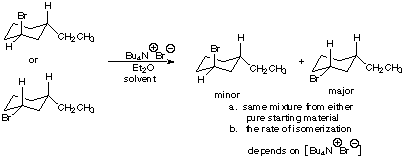![]()
![]()
1. Iodide ion is a good nucleophile and sodium iodide is quite soluble in acetone. On the other hand, sodium chloride and sodium bromide have low solubilities in acetone. As a result, the reaction of alkyl bromides and alkyl chlorides with NaI/acetone can serve as a simple test reaction as indicated below.
R-Br + NaI ---(acetone)---> R-I + NaBr (precipitate, solution becomes cloudy)
The reactivity order of the following alkyl bromides with NaI/acetone is:
CH3CH2Br > (CH3)2CHBr > (CH3)3CCH2Br
Write a mechanism for this reaction. Explain how your mechanism accounts for the observed reactivity order. (It may help to build molecular models.)
2. The optical rotation of a solution of (+)-2-bromobutane in diethyl ether does not change with time. However, when tetrabutylammonium bromide is dissolved in this solution, the rotation decreases slowly with time to zero. The NMR spectrum of the solution, however, does not change. Clearly explain what is happening.
Construct a graph of the mole fraction of (+)-2-bromobutane and (-)-2-bromobutane as a function of time. Why does the rotation decrease to zero? Why doesn't it become negative?
3. Explain the following observation.

4. Discuss how the three experiments above relate to our general understanding of the mechanism of bimolecular nucleophilic substitution reactions.
5. When 4-chloro-2-methyl-2-pentene reacts with acetic acid (solvent), two substitution products are formed with the rearranged product predominating as shown below. When small amounts of acetate ion are added to the reaction mixture, no increase in rate is observed. Give a mechanism that accounts for these results. Explain clearly why two products are formed.

6. Discuss how the experiment above relates to our general understanding of the mechanism of unimolecular nucleophilic substitution reactions.
Materials adapted from:
Peer-Led Team Learning: Organic Chemistry, 1/e
Jack A. Kampmeier, University of Rochester
Pratibha Varma-Nelson, St. Xavier University
Donald Wedegaertner, University of the Pacific
Prentice-Hall, 2001, ISBN 0-13-028413-0
http://www.sci.ccny.cuny.edu/~chemwksp/OrganicChem.html